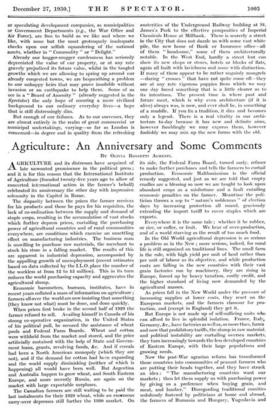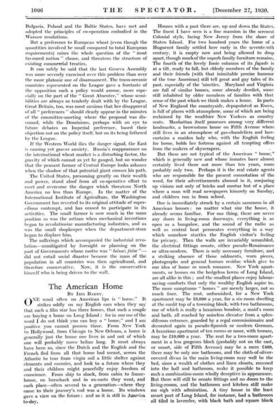Agriculture: An Anniversary and Some Comments
BY OLIVIA ROSSETTI ACRESTI.
AGRICULTURE and its distresses have acquired of late unwonted prominence in the political press ; and it is for this reason that the International Institute of Agriculture (founded twenty-five years ago to allow of concerted international action in the farmer's behalf) celebrated its anniversary the other day with impressive solemnity in the Capitol in Rome.
The disparity between the prices the farmer receives for his products and those he pays for his requisites, the lack of co-ordination between the supply and demand of staple crops, resulting in the accumulation of vast stocks which further depress prices, curtailing the purchasing power of agricultural countries and of rural communities everywhere, are conditions which exercise an unsettling effect on manufacturing industries. The business man is unwilling to purchase raw materials, the merchant to stock his store in a falling market. The results of this are apparent in industrial depression, accompanied by the appalling growth of unemployment (recent estimates based on data collected by the I.L.O. place the number of the workless at from 12 to 15 million). This in its turn reduces the world purchasing capacity and aggravates the agricultural slump.
Economic barometers, bureaus, institutes, have in recent years collated a mass of information on agriculture ; farmers all over the world are now insisting that something (they know not what) must be done, and done quickly.
When prices first broke in the second half of 1929 the farmer refused to sell. Availing himself in Canada of his strong co-operative organization, in the United States of his political pull, he secured the assistance of wheat pools and Federal Farm Boards. Wheat and cotton were withheld from the market and stored, and the price artificially sustained with the help of State and Govern- ment loans, grants, revolving funds, &e. And if cereals had been a North American monopoly (which they are not), and if the demand for cotton had been expanding and the world supply diminishing (neither of which is happening) all would have been well. But Argentina and Australia happen to grow wheat, and South Eastern Europe, and more recently Russia, are again on the market with large exportable surpluses.
The Canadian farmers are still waiting to be paid the last instalments for their 1929 wheat, while an enormous carry-over depresses still further the 1930 market. On its side, the Federal Farm Board, turned surly, refuses to make further purchases and tells the farmers to curtail production. Economic Malthusianism is the official remedy suggested, and just as we are told that empty cradles are a blessing so now we arc taught to look upon abundant crops as a misfortune and a fault entailing economic penalties on the farmer. Meantime the poli- tician throws a sop to " nature's nobleman " of election days by increasing protection all round, graciously extending the import tariff to cover staples which are exports.
Everywhere it is the same tale ; whether it be rubber, or rice, or coffee, or fruit. We hear of over-production, and of a world starving as the result of too much food.
In the Old World agricultural depression is as serious a problem as in the New ; more serious, indeed, for rural life is still organized on traditional lines. The small farm is the rule, with high yield per unit of land rather than per unit of labour as its objective, and while production costs are falling in the new countries with their vast grain factories run by machinery, they are rising in Europe, forced up by heavy taxation, costly credit, and the higher standard of living now demanded by the agricultural masses.
As prices fall in the New World under the pressure of increasing supplies at lower costs, they react on the European markets, and the farmers clamour for pro- tection, and (except in England) they get it.
But Europe is not made up of self-sufficing units who can afford to live in splendid isolation. France, Italy, Germany, &c., have factories as well as, or more than, farms and now that prohibitory tariffs, the slump in raw material, and political instability are curtailing oversee markets, they turn increasingly towards the less developed countries of Eastern Europe, with their large populations and growing needs.
Now the post-War agrarian reform has transformed those countries into communities of peasant farmers who are putting their heads together, and they have struck an idea : " The manufacturing countries want our markets ; then let them supply us with purchasing power by giving us a preference when buying grain, and meat, and lumber." Disregarding traditional enmities sedulously fostered by politicians at home and abroad, the farmers of Rumania and Hungary, Yugoslavia and Bulgaria, Poland . and the Baltic States, have met and adopted the principles of co-operation embodied in the Warsaw resolutions.
But a preference to European wheat (even though the quantities involved be small compared to total European requirements) raises the whole question of the " most favoured nation " clause, and threatens the structure of existing commercial treaties.
It can safely be said that the last Geneva Assembly was more severely exercised over this problem than over the more platonic one of disarmament. The trans-oceanic countries represented on the League gave a foretaste of the opposition such a policy would arouse, more espe- cially on the part of the " Great Absentee," whose sensi- bilities are always so tenderly dealt with by the League. Great Britain, too, was most anxious that her disapproval of all " preferences " should clearly appear in the minutes of the committee-meeting where the proposal was dis- cussed, while the Dominions, perhaps with an eye to future debates on Imperial preference, based their objection not on the policy itself, but on its being fathered by the League.
If the Western World flies the danger signal, the East is causing yet graver anxiety. Russia's reappearance on the international wheat market is a disturbing factor, the gravity of which cannot as yet be gauged, but no wonder that the peasant farmer of Central Europe looks askance when the shadow of that potential giant crosses his path.
The United States, presuming greatly on their wealth and power, stand aloof from all co-operative effort to meet and overcome the danger which threatens North America no less than Europe. In the matter of the International Institute of Agriculture, the Washington Government has reverted to its original attitude of super- cilious contempt, and has ceased to participate in its activities. The small farmer is now much in the same position as was the artizan when mechanical inventions began to revolutionize manufacturing industries, and as was the small shopkeeper when the department-store began to displace him.
The sufferings which accompanied the industrial revo- lution—unmitigated by foresight or planning on the part of Governments whose motto was " laissez faire "- did not entail social disaster because the mass of the population in all countries was then agricultural, and therefore conservative. Now, it is the conservative himself who is being driven to the wall.



































 Previous page
Previous page